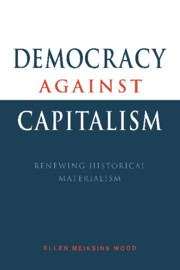Book contents
- Frontmatter
- Contents
- Acknowledgements
- Introduction
- I HISTORICAL MATERIALISM AND THE SPECIFICITY OF CAPITALISM
- 1 The separation of the ‘economic’ and the ‘political’ in capitalism
- 2 Rethinking base and superstructure
- 3 Class as process and relationship
- 4 History or technological determinism?
- 5 History or teleology? Marx versus Weber
- II DEMOCRACY AGAINST CAPITALISM
- Conclusion
- Index
3 - Class as process and relationship
Published online by Cambridge University Press: 13 October 2009
- Frontmatter
- Contents
- Acknowledgements
- Introduction
- I HISTORICAL MATERIALISM AND THE SPECIFICITY OF CAPITALISM
- 1 The separation of the ‘economic’ and the ‘political’ in capitalism
- 2 Rethinking base and superstructure
- 3 Class as process and relationship
- 4 History or technological determinism?
- 5 History or teleology? Marx versus Weber
- II DEMOCRACY AGAINST CAPITALISM
- Conclusion
- Index
Summary
There are really only two ways of thinking theoretically about class: either as a structural location or as a social relation. The first and more common of these treats class as a form of ‘stratification’, a layer in a hierarchical structure, differentiated according to ‘economic’ criteria such as income, ‘market chances’ or occupation. In contrast to this geological model, there is a social-historical conception of class as a relation between appropriators and producers, determined by the specific form in which, to use Marx's phrase, ‘surplus labour is pumped out of the direct producers’.
If the second of these conceptions is specifically Marxist, the first covers a broad spectrum from classical sociology up to and including some varieties of Marxism. So, for example, class defined as ‘relation to the means of production’ can take a form not so very different from the income differentiation of conventional stratification theory; and some of the most recent and influential theories of class elaborated under the rubric of ‘Rational Choice Marxism’ have deliberately shifted the focus of class away from the social relations of surplus extraction to the distribution of ‘assets’ or ‘endowments’. Here, as in theories of stratification, the operative principle is relative advantage or inequality, not direct social relations between appropriators and producers but indirect relations of comparison among people differentially situated in a structural hierarchy. By contrast, for ‘classical’ Marxism the focus is on the social relation itself, the dynamic of the relation between appropriators and producers, the contradictions and conflicts which account for social and historical processes; and inequality, as simply a comparative measure, has no theoretical purchase.
- Type
- Chapter
- Information
- Democracy against CapitalismRenewing Historical Materialism, pp. 76 - 107Publisher: Cambridge University PressPrint publication year: 1995
- 2
- Cited by



